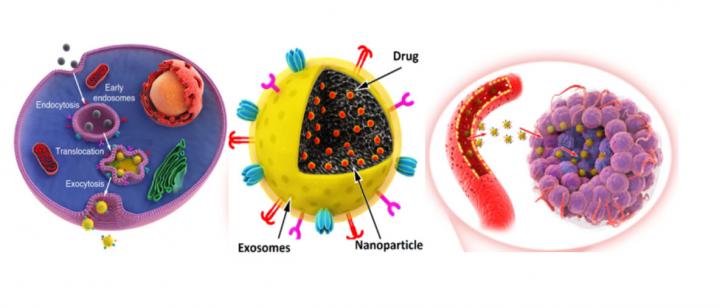

The researchers have harnessed exosomes together with synthetic nanomaterial as carriers of anticancer drugs.
Credit: Santos Lab
Exosomes contain various molecular constituents of their cell of origin, including proteins and RNA. Now the researchers have harnessed them together with synthetic nanomaterial as carriers of anticancer drugs.
The new exosome-based nanomedicines enhanced tumor accumulation, extravasation from blood vessels and penetration into deep tumor parenchyma after intravenous administration.
“This study highlights the importance of cell-based nanomedicines”, says the principal investigator and one of the corresponding authors of this study, Hélder A. Santos, Associate Professor at the Faculty of Pharmacy, University of Helsinki, Finland.
Nanoparticles-based drug delivery systems have shown promising therapeutic effcacy in cancer. To increase their targettibility to tumors, nanoparticles are usually functionalized with targeted antibodies, peptides or other biomolecules.
However, such targeting ligands may sometimes have a negative infuence on the nanoparticle delivery owing to the enhanced immune-responses.
Biomimetic nanoparticles on the other hand combine the unique functionalities of natural biomaterials, such as cells or cell membranes, and bioengineering versatility of synthetic nanoparticles, that can be used as an efficient drug delivery platform.
The developed biocompatible exosome-sheathed porous silicon-based nanomedicines for targeted cancer chemotherapy resulted in augmented in vivo anticancer drug enrichment in tumor cells.
“This demonstrates the potential of the exosome-biomimetic nanoparticles to act as drug carriers to improve the anticancer drug efficacy”, Santos concludes.












